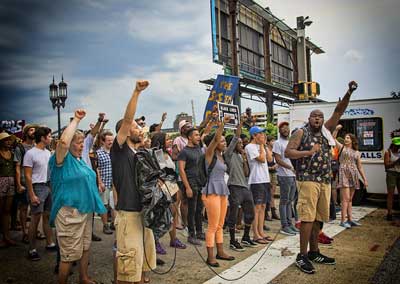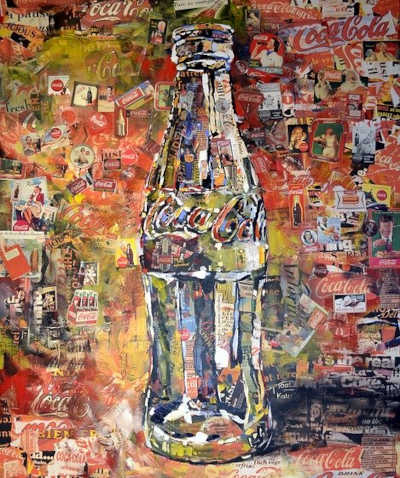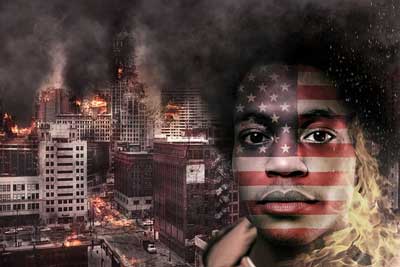

Highlights
"The year 2016 a case similar to George Floyd took place"— Eloïsa Frappant
"The percentages were 17% white people were not working at that moment meanwhile 35% of black people - the double of the population - were unemployed as well"— Eloïsa Frappant
"He was killed by suffocation by a policeman that was convinced he was just pretending"— Eloïsa Frappant
" But the old Europeans who didn’t want to establish in America did the same as their companions"— Eloïsa Frappant












It is known that racism seems to be, among other subjects, an actual concern for the majority of population around the globe. The intense demonstration over the death of an arrested pedestrian confirms what we could have already suspected. But why is there such an incredible turmoil around cultural identity and ethnicity?
The XXI century has become the blossoming of globalization and media which has cause, as a phenomenon, the communication between other countries and cultures as well. A process which was never so intense before.
But it has their own issues. The tendency of discrimination and violence caused by race, is very alarming, yet persisting. The among of hatred towards minorities such as Native Americans and Black People are something to reflect on, plus according to PBS News Hours nearly a quarter of young black people say they’ve been harassed by police.
In fact, during the social movement Black Lives Matter a lot of people has participated in a thousand of demonstration in support of the black community. But American people are not the only. After Jorge Floyd case and constabulary misconduct, lots of people around the world felt compelled at that time to support the movement and to vindicate the same message around the world: “Black Lives Matter”.
Besides, the United States is not the only country who has to confront racist social disruptive. In France, last year during the same days, French people claimed for social justice as well to end race discrimination. The year 2016 a case similar to George Floyd took place. Adama Traoré, a young black male aged 24, was killed by the same cause as Floyd under strange constabulary circumstances. He was killed by suffocation by a policeman that was convinced he was just pretending.
The repercussion of Jorge Floyd death it still a lemma to represent the movement Black People Matter around the globe. And it shows, because also other foreign countries such as German, Spain, Great Britain or Denmark participated in the demonstration to vindicate the death of George Floyd and the black discrimination. So it was proved once again the need to support these movements in the world we live in today, a world more fairly that it has been.
But, the problem still there. There are a a lot of opposers of social equality who believe that some group of people are superior than another, and that white people should have more privileges among black people. Ku Klux Klan or even neo-Nazis still very active and spreading around the country.
In the same terms, it’s important to remember and remark an historical and academically studied fact that has to be brought in our conscious minds. Before the 70s in Jamaica, the idea of race didn’t exist. Jamaica was full of mixed races where any color skin could be found, from white people to dark people. But, at the moment they were assimilated in the western modern world this situation and social environment changed. And the concept of race took place in the daily life of people who never was disquiet by that.
In fact, tracking its own history, race hasn’t been a word of exclusion - except some cases - before colonialism started in the XIX century. Race and ethnics were only political and cultural terms such as conquest of territories or the assimilation of other cultures. But it has not a metaphysical meaning. Even the mix of races is something usual. E.g. The mix between Romans and Wales people or Spaniards and Arabic people. During some ages, these combinations of genes were representations of the changes in the Global Map.
But, we could track already when racism began: new technology, machinery, international trade and a curiosity to travel to unknown and mysterious lands. We are talking about colonialism from the XIX century, a period of time characterized for the will of land expansion, resources and money increase and a subconscious desire for power and domination.
The technical ages from Enlighten Age, brought to the colonialists the opportunity to fabricate their tools and machinery by themselves, causing expropriation of foreign wealth from other lands and the trade of people, black people, as a force of labor. A group of people who were obliged to exist their countries, and continent, to ship to the Promise Land.
But the old Europeans who didn’t want to establish in America did the same as their companions. Since they plunder and conquered as colonies countries like India, African lands and South America territories which their own cultures, erasing their diversity and for one reason: their own and vast benefit in terms of wealth.
During that age, in the U. S there was any critical concern about the different treatment that White and Black People had. But later on, as the country was organizing itself, they began to develop different ideologies, such as conservatives and abolitionists. Both parties were against which other, since the abolitionist believed that black people should be freed. After some crucial events during the Civil war (1861 - 1865) the abolitionist party won and slavery end.
But, why is still an issue to be Afro-American in the U.S.? And why racism is so powerful yet? As Nietzsche said in his work On Truth and Lies in a Non-moral Sense (1896), truth is only a false concept to hide its true meaning: power.
So, if a black person or women didn’t have a soul as they claim intellectuals from the European colonialism, there was no used to be concerned by their rights as human beings and patriarchy and slavery were then something unavoidable.
But there it is: people as Martin Luther King or Mahatma Gandhi demonstrated to people that racism could be fought in great terms. Also, people like Rosa Parks, a mid-aged woman who refused to seat in the back of a bus, marked a hit in history vindicating black people segregation. Artists like Nina Simone also share some thoughts and even participated as an activism during the 60s disturbs.
In fact, one of her songs, "Mississippi Goddam", were inspired by a slaughter committed in the hands of Ku Klux Kan. Over 4 young girls between their 11 and 14 years old died that day, inside the in the morning 15th September 1963 in the Baptiste Church 16th Street.
Nina Simone said herself:
“At first I tried to make myself a gun. I gathered some materials. I was going to take one of them out, and I didn’t care who it was,” Simone famously said after hearing of the Birmingham bombing. “Then Andy, my husband at the time, said to me, ‘Nina, you can’t kill anyone. You are a musician. Do what you do.’ When I sat down the whole song happened. I never stopped writing until the thing was finished.”
So, as we can see, it has took a long journey to arrive to our present days. But there’s hope. Nowadays, it’s blossoming a new speech that claims for diversity, social justice and sorority between each other. We can see it in marketing, brands, films, songs, etc. who also embrace people with disabilities or singular health issues.
One example is the inclusive barbie, who’s creators had made in the recent years. This barbie uses a chair in wheels, fitting with the role model some girls may need because of their circumstances. There are also barbies with leg prothesis or vitiligo, a skin condition that creates depigmentation in the skin.
So is happening in films, where the footage are being increasingly inclusive with people of color or discriminate groups of people, as disable people. In fact, this year, the Oscars delivered the best supporting actor award to Daniel Kaluuya (for the film Judas and the Black Messiah) and the best director award to Clohé Zhao (for the film Nomadland). She was born in Beijing but moved in America very young when she started college.
But, how this type of discrimination takes place in quotidian daily routine?
Black women and pregnancy
It is know that the rate of birth-death in women of color is higher than white women or Latin women. Black, American Indian, and Alaska Native (AI/AN) women are two to three times more likely to die from pregnancy-related causes than white women, according to the CDC newsroom (the web page of Centers for Disease control and prevention).
The reasons about it are multiple. But the first one is the lack of interest in these patients due to their discrimination. Doctors around the U.S. seems to stop less attention to the obliged medical procedures of pregnancy, e.g. postponing visits to the doctor - increasingly during the pandemic - and to have a tendency be less careful to watch over the mother health and her baby as well, e.g. during ultrasounds.
But is not only a technical problem, the perspective of obstetric doctors at the moment to face a new case of pregnancy changes completely when the race of the patient shows off - excluding cultural background, social status and economic level achieved and kept. So often they misjudge their symptom, minimize or discredit so “it has to be a normal thing what you have”.
Dr. Allison Bryant Mantha, vice chair of quality, equity and safety in the obstetrics and gynecology department of Massachusetts General Hospital in Boston says in a report from February 20th 2019 for the American Hearth Association digital magazine:
"Racism affects, so many things before the patient even gets to the clinical encounter," she said. "Both implicit bias and structural racism affect how women are cared for in the health care system."
In the same report, Dr. Ana Langer, director of the Women and Health Initiative at the Harvard T.H. Chan School of Public Health in Boston, says:
"It's basically a public health and human rights emergency because it's been estimated that a significant portion of these deaths could be prevented".
Black American judicial system
The criminal justice system in America is well known to be very biased. And not everyone has the same rights to defense themself during the court or to mediate the rate time they will spend in prison. And there is, as well, some tendencies to prejudice by not being fair some minorities.
According to The Sentencing Project, in a digital article published April 19th 2018, called Report to the United Nations on Racial Disparities in the U.S. Criminal Justice System, they manifest and criticized how even nowadays judicial system in America is so unfair for Black People.
But what is more hopelessly is the difficulty to reform a system where there is so much work to do, beginning with police, pretrial and sentencing structures. Jorge Floyd case, has reopen the lemma "Black Lives Matter", but could this movement revise and rebuilt the damage already done?
To finish, we have to take in a consideration some data from the virtual post, as they claim justice had never begun for Black People in America. They say as a claiming protest:
African Americans are more likely than white Americans to be arrested; once arrested, they are more likely to be convicted; and once convicted, and they are more likely to experience lengthy prison sentences. African-American adults are 5.9 times as likely to be incarcerated than whites and Hispanics are 3.1 times as likely. As of 2001, one of every three black boys born in that year could expect to go to prison in his lifetime, as could one of every six Latinos—compared to one of every seventeen white boys. Racial and ethnic disparities among women are less substantial than among men but remain prevalent.
Black people in the job market
Other type of discrimination that suffers black community in the stigma of being black in a work place. In fact, in the country, black people are twice probable to be unemployed than white people. But, this phenomenon is something that also occurs in other countries such the British Island.
BBC made a report in April 14th 2021 to a 21 years old Mary Ibiyemi from Glasgow who lost her job in a takeaway last year because her employer "just couldn't keep me on anymore" in the pandemic as the post says.
She then spent fruitless months looking for jobs, a time when her self-esteem "just went down”, continues explaining the 21 young girl to the media
"My surname isn't one a lot of people can pronounce, and I feel employers are more likely to skip over it," were one of the sentences delivered to the reporters.
She explains herself:
"I feel if you're from the black or Asian communities, if you have a hard-sounding name then they are less likely to take the time to get to know the person, the pronunciation and try to work with you as a person."
Bayer and Charles, as well, reported indeed a graphic with black and white differences in the work place. As they say, in 2017, the percentages were 17% white people were not working at that moment meanwhile 35% of black people - the double of the population - were unemployed as well. In face, even when black people achieve the goal of being employed they used to earn over nearly 25% less than their white companions.
Image from Bruce Emmerling